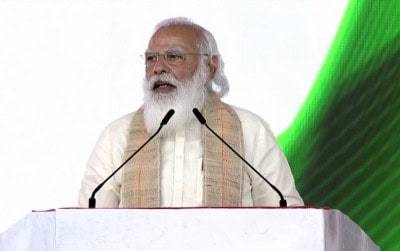New Delhi, March 20 : Prime Minister Narendra Modi has met with US Defence Secretary Lloyd Austin and stressed the commitment to the strategic partnership between the two countries amid rising tensions in the region and around the world with China.
Modi tweeted after their meeting on Friday, “Pleasure to meet U.S. @SecDef Lloyd Austin today. Conveyed my best wishes to @POTUS @JoeBiden. India and US are committed to our strategic partnership that is a force for global good.”
Austin also met with National Security Adviser Ajit Doval, according to the US embassy.
Soon after his arrival, Austin tweeted that his discussions in India would centre on cooperating to face “most pressing challenges” in the Indo-Pacific region where China’s aggressive actions, from the Himalayas to the South China Sea are on the rise.
He is scheduled to meet Defence Minister Rajnath Singh and the delegations from the two countries are to hold discussions during his visit.
The first visit by a member of US President Joe Biden’s Cabinet to India came as leaders of the US and China clashed at a meeting in Alaska symbolising the growing aggressiveness of China.
It is particularly highlighted in the Indo-Pacific region and the US is responding by working closely with allies and partners.
Austin tweeted, “Thrilled to be here in India. The breadth of cooperation between our two nations reflects the significance of our major defense partnership, as we work together to address the most pressing challenges facing the Indo-Pacific region.”
Outlining Austin’s agenda in India, Acting Assistant Defence Secretary for Indo-Pacific, David F. Helvey, said that he will “discuss operationalising the major defence partnership that we have with India, including through enhanced information sharing, regional security cooperation, defence trade, and cooperation in new domains.”
The Indian Defence Ministry said that Singh and Austin “are expected to discuss ways to further strengthen bilateral defence cooperation and exchange views on regional security challenges and common interests in maintaining a free, open and inclusive Indo-Pacific region.”
It added, “Discussions regarding defence cooperation would also focus on how both countries could consolidate military-to-military cooperation and defence trade and industry cooperation.”
The US designated India as a major defence partner by the US in 2016 allowing it access to some defence hi-tech that would normally be available only to allies.
The visit reflects President Joe Biden’s focus on the Indo-Pacific region to meet the Chinese challenge.
Last week Biden held a virtual summit with other leaders of the Quad nations, Prime Ministers Narendra Modi of India, Scott Morrison of Australia and Yoshihide Suga of Japan, at which they discussed security issues in the face of Chinese aggressive actions.
While on his way to India, Austin spoke to Australia’s Foreign Minister Maria Payne, who also holds the defence portfolio.
Helvey said that Austin spoke to her about the “Quadrilateral process” of the four nations.
Before coming to India, Austin had visited two US treaty allies, Japan and Korea, on the frontlines of Chinese aggressiveness at sea in the region, and the military headquarters of the Indo-Pacific headquarters in Hawaii.
He and Secretary of State Antony Blinken held 2+2 ministerial meetings with their counterparts in Seoul and Tokyo.
The meeting of Blinken and US National Security Adviser Jake Sullivan with senior Chinese officials, State Councilor Wang Yi and Communist Party Foreign Affairs Director Yang Jiechi and State Councilor Wang Yi, opened yesterday in Anchorage, Alaska, with open hostility.
Blinken said: “We will always stand up for our principles for our people, and for our friends.”
Yi retorted that the US was trying to “obstruct normal trade exchanges, and incite some countries to attack China” — a veiled reference to India, which hs defended itself against a by Beijing’s army along the Line of Actual Control.
Disclaimer: This story is auto-generated from IANS service.

